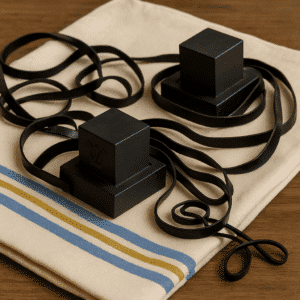What to Do If Your Tefillin Fall to the Ground
When tefillin fall to the ground, even accidentally, it is considered a serious matter in Jewish law. These sacred objects — containing Torah scrolls with the Divine Name — must always be treated with utmost respect (kavod) because of their holiness (kedusha). Let’s explore how serious such an incident is, the halachic laws involved, what to do immediately afterward, and what spiritual steps are recommended. We’ll also end on an encouraging note — turning this accident into an opportunity for spiritual growth.
The Gravity of a Fallen Sacred Object
In Judaism, dropping a sacred object is taken very seriously. The Shulchan Aruch teaches that even seeing a holy item treated disrespectfully should cause one distress and self-reflection. When a Sefer Torah (Torah scroll) falls, the custom is that not only the person who dropped it but also the witnesses fast in repentance — mourning the dishonor caused to the Word of God.
Tefillin, which contain entire passages of the Torah and the Divine Name, are likewise considered extremely sacred. Their fall is seen as a major lack of kavod, demanding a respectful and spiritual response.
Rabbi Yisrael of Brünn (the Mahari Brünn) wrote that such a fall is a sign from Heaven — a call to self-examination and repentance. The Chida (Rabbi Chaim Yosef David Azulai) adds that fasting was instituted as atonement for carelessness or lack of vigilance that led to the fall. In essence, Heaven uses the incident to awaken a person to greater awareness and respect toward holiness.

Kavod and Kedusha: The Laws of Respect and Holiness for Tefillin
The Shulchan Aruch (Orach Chaim 40–42) details several laws that preserve the dignity and holiness of tefillin:
-
Never handle them carelessly: Throwing or tossing tefillin, even lightly, is strictly forbidden. Suspending them by their straps or boxes is also considered disrespectful unless they are within a protective bag.
-
Keep them away from impure places: Because of their holiness, tefillin should never be exposed in places of impurity (like bathrooms or bedrooms during intimacy). If one must enter such a space, they must be enclosed in two coverings (keli betoch keli), e.g., their box and then a bag.
-
Do not place them on the floor: Tefillin should never rest directly on the ground. They should be placed on a clean, elevated surface, and no mundane object should be put on top of them.
In short, one must treat tefillin with reverence, handling them with clean hands and sincere respect. Every detail of halacha surrounding tefillin reflects their divine significance.
What to Do Immediately After They Fall
If your tefillin fall, act right away — calmly but respectfully:
-
Pick them up immediately with care and affection. It’s customary to kiss them upon lifting them, as one would kiss a fallen holy book, expressing love and regret.
-
Assess the situation: Were they inside their case, or did the actual batim (leather boxes) touch the ground? This distinction determines the level of response required.
-
If they fell in their bag or box: This is less severe. Since the tefillin themselves didn’t touch the ground, there’s no requirement to fast. However, as a sign of reverence, it’s proper to give a small tzedaka (charity) donation. Check to ensure the boxes and straps weren’t damaged or opened.
-
If the boxes touched the ground directly: This is more serious. Tradition requires the person to fast for one day, typically the same day the fall occurred. If fasting is difficult, a half-day fast combined with tzedaka is accepted. If the fall was minor (e.g., from a short height or onto a soft surface), some authorities rule that fasting is unnecessary.
Should you notice any crack or damage, stop using them immediately and have them checked by a sofer (scribe). -
Maintain composure and kavanah (focus): If this happens during prayer, stay calm, complete the prayer respectfully, and take care of the spiritual response afterward.
In short: lift quickly, check condition, distinguish between protected or direct fall, and act accordingly — tzedaka for minor cases, fasting or repentance for direct contact.

Spiritual Steps of Teshuva (Repair)
Halacha emphasizes not only physical care but also spiritual repair after such an incident. Here are traditional ways to respond:
-
Fasting: The classic custom. The Mishnah Berurah notes that “the common practice is to fast” after tefillin fall directly on the floor.
Yet many modern rabbis allow substitutions if fasting is too difficult — for instance, half-day fasting and giving charity equivalent to the cost of the missed meals. -
Tzedaka (Charity): A highly recommended form of kapara (atonement). Giving charity to the poor transforms the embarrassment into merit. You may give the value of the meals you would have skipped or another meaningful amount.
-
Learning Torah about Tefillin: Studying the halachot of tefillin is a spiritual response praised by rabbis. By learning the laws of their care and holiness, one repairs the oversight that may have caused the fall.
-
Ta’anit dibbur (fast of speech): Some take upon themselves to refrain from idle speech for a day — dedicating time only to prayer and Torah. This shows restraint and mindfulness in place of physical fasting.
-
Taking a personal resolution: Strengthen an aspect of your observance — for example, avoid talking while wearing tefillin, or improve your kavanah during the mitzvah. Turning the mishap into a growth opportunity is considered one of the most powerful forms of teshuva.
Ultimately, the goal isn’t punishment but elevation. The key is sincerity and renewed respect for this mitzvah.
Should You Clean or Check the Tefillin?
After the fall, two questions arise: Should they be cleaned? Should they be checked by a sofer?
-
Cleaning: Tefillin do not become “impure.” If they are dusty, gently clean them with a dry, soft cloth. Never use water or chemicals. If they fell in dirt or mud, clean carefully and consult a professional sofer to avoid damage.
-
Inspection: If the boxes cracked, seams loosened, or you hear something moving inside, have them checked by a qualified sofer. Even without visible damage, some rabbis recommend having them inspected if the fall was hard.
Remember: halacha requires tefillin to be checked periodically — ideally once a year for daily wearers — so this could be a good opportunity.
Taking this as a cue to improve the care of your tefillin — replacing worn straps or upgrading the case — is a beautiful expression of kavod.
Transforming a Fall into Spiritual Elevation
Seeing your tefillin fall can be shocking and painful for someone who loves this mitzvah. Yet Jewish thought teaches that even in such moments, one can rise higher.
Rather than despair, use this as a reminder from Heaven to strengthen your bond with holiness. Perform teshuva, give charity, study, or simply renew your respect when putting them on.
As the verse says:
“The righteous may fall seven times, but he rises again” (Proverbs 24:16).
The greatness of a Jew lies not in never falling — but in always rising with deeper awareness and love for Hashem.
May your renewed kavod for your tefillin turn this accident into a merit — and may your daily mitzvah of tefillin continue to illuminate your life with holiness and closeness to the Creator.


